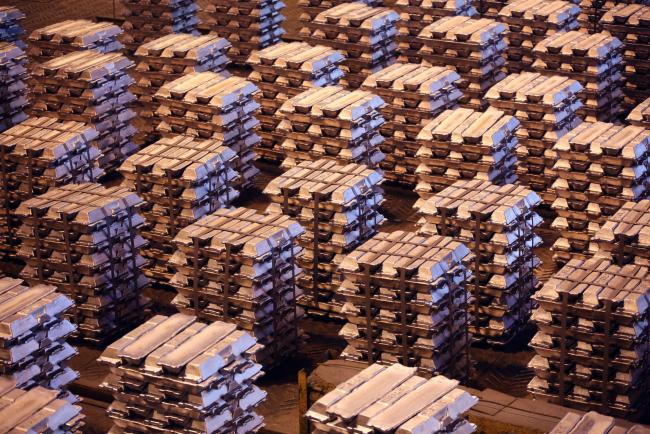(Bloomberg) -- The U.S. softened its position on sanctions against Russian metals giant United Company Rusal Plc (MCX:RUAL), sparking a record plunge in aluminum prices.
For the first time, the U.S. Treasury discussed a path for lifting the sanctions on Rusal, saying it would provide relief if Oleg Deripaska relinquished control. It also extended the deadline for companies to wind down dealings with the Russian aluminum producer by almost five months.
Rusal petitioned to be removed from the sanctions list and Treasury granted the extension while it considers the appeal, according to a statement from Treasury Secretary Steven Mnuchin.
“Rusal has felt the impact of U.S. sanctions because of its entanglement with Oleg Deripaska, but the U.S. government is not targeting the hardworking people who depend on Rusal and its subsidiaries,” Mnuchin said.
Aluminum plunged in response as traders speculated that supply disruptions could ease. Prices fell as much as 9.4 percent, the most ever. U.S. metal producers also dropped, with Alcoa Inc (NYSE:AA). sliding 12 percent.
Washington’s clarification follows two weeks of chaos in global metal markets. Aluminum shot to multi-year highs as manufacturers scrambled to secure supply. A German lobbying group said European plants may be forced to close and carmakers could face supply shortages.
The U.S. statement also adds pressure on Deripaska as he tries to save the company without surrendering control. He owns 48 percent of Rusal and controls it through a shareholder agreement with others including Glencore (LON:GLEN) Plc and Viktor Vekselberg, who is also under sanctions.
"If there were previously doubts if Rusal will remain sanctioned if Deripaska sells out, now we have a clear answer," Oleg Petropavlovskiy, analyst at BCS Global Markets, said by phone. "Changing ownership structure would be a solution for the company."
While analysts have suggested that nationalization may be the only solution, Russian Finance Minister Anton Siluanov told reporters Friday that Rusal was not on the list to be nationalized.
Rusal declined to comment. Deripaska’s spokeswoman wasn’t immediately available.
Rusal produces about 6 percent of the world’s aluminum and operates mines, smelters and refineries across the world from Guinea to Ireland, Russia to Jamaica.
Lots of Pressure
“It should calm things down,” said Daniel Briesemann, an analyst at Commerzbank AG (DE:CBKG). “It looks as if there was a lot of pressure from the U.S. aluminum downstream industry.”
At Russia’s request, Mnuchin met with Russian Finance Minister Siluanov during International Monetary Fund meetings in Washington last week. The Russians were seeking “clarification” on U.S. sanctions, Mnuchin said to reporters Saturday, without elaborating.
“Mnuchin’s statement about the de-listing signals that this is more than just getting an extra few months to stop business with Rusal,” said Brian O’Toole, a senior fellow at the Atlantic Council who previously worked in Treasury’s sanctions unit. “It shows that Rusal is trying get off the list.”
The selloff in aluminum after the Treasury announcement spread through other commodity markets on optimism the U.S. isn’t likely to impose further sanctions on Russia’s metals and energy companies.
Palladium plunged by as much as 5.4 percent and nickel as much 6.7 percent. They had both jumped over the last two weeks because of concern that Vladimir Potanin, the billionaire who controls Russia’s biggest miner MMC Norilsk Nickel (MCX:GMKN), could be targeted.
(Updates with analyst quote, background throughout.)
